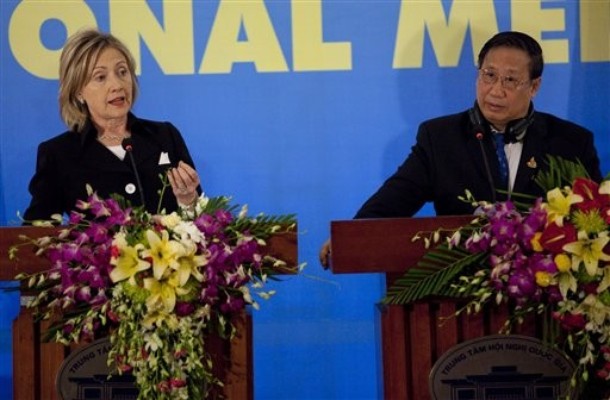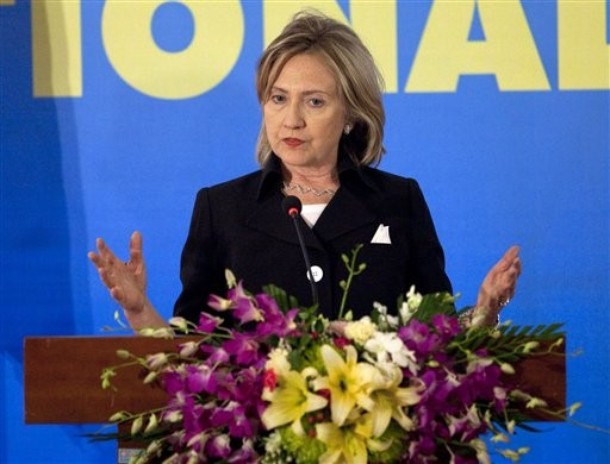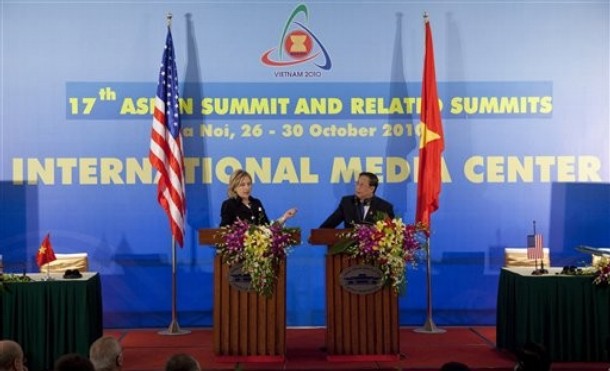Remarks With Vietnamese Foreign Minister Pham Gia Khiem
Secretary of State
PARTICIPANT: Ladies and gentlemen, the first signing ceremony with the agreement between the Ministry of (inaudible) and the State Department of the United States of America. (Inaudible.) And may I invite the Deputy Prime Minister of Vietnam Pham Gia Khiem and Secretary of State of America Madam Hillary Clinton to take to the stage and to witness the signing of the agreement.
(The agreement was signed.) (Applause.)
We invite (inaudible) from Vietnam Airlines and Mr. Seborn (ph) from Boeing to take the stage and may I invite (inaudible) from the Ministry of Information and Communication and Mr. Markel (ph) from Microsoft to take to the stage. And now with the presence of the Deputy Prime Minister Pham Gia Khiem and Secretary Clinton, we are witnessing the signing of the agreement for the Boeing 787-9 between Vietnam Airlines and Boeing. (Applause.) For the next signing, may I also invite Minister Le Doan Hop, Minister of Information and Communication of Vietnam. With the signing of these agreements, we are looking at an increase of trade between our country and (inaudible). (Applause.) Thank you very much and now the signing ceremony ended. We now invite Madam (inaudible) to begin the press conference. Thank you very much.
MODERATOR: (In Vietnamese.)
FOREIGN MINISTER KHIEM: (In Vietnamese.)
SECRETARY CLINTON: Thank you very much, Foreign Minister. It is a pleasure to be back in Hanoi again and to have the honor of witnessing the completion of the major agreement between our nations. Boeing and Microsoft are two of America's great companies and the partnerships you have cemented today will provide tangible benefits both to Vietnamese and to Americans.
I'm also very pleased to see the agreement regarding the United Nations Convention Against Torture signed. This convention represents a decades-long commitment by the international community to respect human rights and dignity. The United States is honored to support the people of Vietnam as they reaffirm their commitment to this cause by ratifying this convention.
The agreement is a direct result of the dialogue on human rights between our two countries. Further proof that discussions of even difficult issues can produces real results.
As some of you know, this is my second visit to Hanoi this year and it is a sign of the importance that the United States places on our relationship with Vietnam, with Southeast Asia and with the entire Asia Pacific region. This week marks the first time ever that the United States has participated in an East Asia summit and I would like to thank Prime Minister Dung for inviting me to be a guest of the chair at this gathering. President Obama is looking forward to joining the East Asia Summit next year in Indonesia.
The United States is committed to engaging with the East Asia Summit over the long term, because we believe it can and should become a key forum for political and security issues in the Asia Pacific. The EAS also provides and opportunity to consult directly with leaders from across the region. I had a number of productive meetings last night and today with my counterparts and other leaders from South Korea, Russia, China, India, Vietnam, and others. I'd like to give a brief readout from my discussions both with the prime minister and the foreign minister.
It is clear that our countries have reached a level of cooperation that would have been unimaginable just a few years ago. We have moved beyond a painful past and built a relationship that is built on mutual respect, friendship, and a common interest in a stable, secure, and prosperous Asia Pacific region. In our discussions, we reaffirmed our shared interest in working toward a strategic partnership and we covered a wide range of other issues. We talked about the importance of our growing cooperation on maritime security, search and rescue operations, and disaster relief.
This year's typhoons have been particularly devastating for the Vietnamese people, making our joint efforts in this area more urgent than ever. And like all friends of Vietnam, we were saddened by the tragic loss of life in the recent floods here and I want to extend my sincere condolences to those who have lost loved ones, homes, and businesses. As we cooperate more closely on disaster relief, we are broadening our security exchanges to include three annual dialogues that will strengthen our military to military ties and result in concrete benefits for the Vietnamese people.
We also had an excellent meeting this morning on the Lower Mekong Initiative and Vietnam is a real leader in looking for ways we can cooperate to mitigate against the environmental damage that is occurring in the Lower Mekong Basin.
On trade, our two countries have already made great progress. Fifteen years ago, our bilateral trade was about $450 million. Last year it was more than $15 billion. And the foreign minister and the prime minister and I talked about how to expand this trade relationship, including through the Transpacific Partnership. The United States, Vietnam, and seven other countries finished a third round of negotiations on the TPP this month and we hope that Vietnam can conclude it in internal process and announce its status as a full member of the partnership soon.
In health, the United States has provided substantial funding for Vietnam's efforts to strengthen its health system, and combat HIV/AIDS, Avian Flu, and emerging pandemic threats. Next year, we will start work on a $34 million project to remove the dioxin from the soil at Da Nang Airport, a legacy of the painful past we share, and a sign of the more hopeful future we are building together.
Climate change, as we head into negotiations in Cancun this November, we hope to work with Vietnam and other countries to build on the progress that we made in Copenhagen. In addition, at the meeting of the Lower Mekong Initiative, we discussed how to work together to adapt to the effects of a changing climate. And we had a very constructive discussion about the potential impact of building dams on the Lower Mekong. The United States has recommended a pause before major construction continues, and we will sponsor a study of this issue.
Now, although the partnership between our two countries is strong and getting stronger, as with all friends we have areas of disagreement. One of those areas concerns human rights. While the agreement we witnessed being signed today is certainly a step in the right direction, the United States remains concerned about the arrest and conviction of people for peaceful dissent, the tax on religious groups, the curbs on Internet freedom, including of bloggers. Vietnam has so much potential, and we believe that political reform and respect for human rights are an essential part of realizing that potential.
The last time I was here, in July, we celebrated 15 years of relations between Vietnam and the United States. This time we celebrate 1,000 years for Hanoi as the capital of Vietnam. And I want to extend my congratulations to the citizens of this beautiful city, and my best wishes to all of the people of Vietnam. I look forward to working with you, and with the people of Vietnam, to expand our work, our partnership, and our friendship in the years to come. Thank you so much.
(Applause.)
MODERATOR: (In Vietnamese.)
QUESTION: (In Vietnamese.)
FOREIGN MINISTER KHIEM: (In Vietnamese.)
SECRETARY CLINTON: Well, thank you, because we too believe that education is one of the most important parts of our relationship. And it is one where we have seen positive growth.
For the past three years, we have brought together Vietnamese and American academics, government leaders, private sector entrepreneurs to discuss how we can better collaborate in promoting education. During that time, the number of Vietnamese students studying in the United States has nearly tripled, rising to more than 13,000. And we are strongly supporting educational exchanges and academic collaboration, including through the Fulbright program and our English language program.
We also are committed to working with Vietnam as Vietnam reforms its education system, and fostering private U.S.-Vietnam education programs, including an American style university.
So, we think there is unlimited potential here. And in my two trips over the last four months I have had a number of young people tell me that they would love to study in the United States, they would love to learn English, and we want to help those young people achieve their goals.
MODERATOR: Thank you. (In Vietnamese.)
QUESTION: Hi, good afternoon. I am with NPR. China's government has expressed some displeasure about the U.S. role in the Diaoyu or Senkaku Islands dispute, including your remarks with Japanese Foreign Minister Maehara. I am wondering. Given the situation, what can the U.S. do, if anything, to act as a mediator or a broker in this situation?
I am also wondering if Foreign Minister Yang had any reassurances or clarifications to offer, as its been reported, on China's rare-earth exports policy? And also, does he have any suggestions of what China can do to break the impasse of North Korean nuclearization? Thank you.
SECRETARY CLINTON: Well, first, with respect to the Senkaku Islands, the United States has never taken a position on sovereignty, but we have made it very clear that the islands are part of our mutual treaty obligations, and the obligation to defend Japan. We have certainly encouraged both Japan and China to seek peaceful resolution of any disagreements that they have in this area or others. It is in all of our interest for China and Japan to have stable, peaceful relations. And we have recommended to both that the United States is more than willing to host a trilateral, where we would bring Japan and China and their foreign ministers together to discuss a range of issues.
On the rare-earth minerals matter, the foreign minister, Minister Yang, clarified that China has no intention of withholding these minerals from the market. He said that he wanted to make that very clear. Now, the fact is that they're called rare-earth for a reason; they are rare. And the United States, along with other allies -- Japan and Europe and elsewhere -- are going to be looking for more resources and looking for more sources of these rare-earth minerals. So, while we're pleased by the clarification we received from the Chinese Government, we still think that the world, as a whole, needs to find alternatives and to find new sources, which we will be pursuing.
And, finally, I spoke at length with both President Lee of South Korea, with my Japanese counterpart when I met with him in Honolulu, and with Minister Yang on North Korea. This is a matter of great concern to all of us, and we continue to urge the North Koreans to return to the negotiating table, to pursue what they began in 2005, which were a series of commitments to take irreversible steps for denuclearization of the Korean Peninsula. So we stay in very close touch with our Japanese, Korean, Chinese, and Russian counterparts to do what we can to try to move North Korea on to a more productive path.
MODERATOR: Thank you. (In Vietnamese.)
QUESTION: (In Vietnamese.)
SECRETARY CLINTON: Well, when President Obama came into office and I became Secretary of State, one of our highest priorities was to reaffirm our commitment to the Asia-Pacific region. The United States is uniquely situated in the world as both an Atlantic and a Pacific power. And we not only wanted to deepen our bilateral relations, as we are with Vietnam, and as we have with other countries in the region, but we wanted to participate more actively in the regional institutions like ASEAN.
So, one of the very first trips that I made -- actually, the first trip I made as Secretary of State -- was to East Asia, including going to the ASEAN headquarters in Jakarta, and committing that the United States would accede to the Treaty of Amity and Cooperation, so that we could be a participant in the activities of the ASEAN regional forum, and make a real commitment to the ASEAN nations organization.
We also believe that the East Asia Summit, where you bring other countries in addition to the core ASEAN countries together to discuss political and security matters, is a very important forum for the United States to be part of. I said earlier today at the East Asia Summit meeting with the leaders that where issues of a political, economic, and security consequence are being discussed in the region, the United States wants to be there.
We were very pleased that Vietnam, as the chair of ASEAN in 2010, has facilitated our participation, and invited us as a guest of the Chair. And we were delighted when we were offered the chance, along with Russia, to join. The United States has deep, lasting relationships in the Asia-Pacific, and we want to be a good partner, a good friend, a good neighbor. And I think one of the ways we can demonstrate that is by being an active participant in organizations like the East Asia Summit.
MODERATOR: Thank you. (In Vietnamese.)
QUESTION: Thank you. This is a question for Secretary Clinton and Foreign Minister Khiem.
You mentioned you raised human rights issues and these recent arrests with the foreign minister. I am just interested in what he told you, and how you accepted the response. And maybe the foreign minister can talk about that.
And also, an interesting part of the evolving U.S.-Vietnamese relationship is the civil nuclear cooperation agreement. I was interested in what the status is of those negotiations, and if the U.S. will allow Vietnam to produce its own nuclear fuel enriched uranium, an element of that agreement. And I was interested in where that stands. Thank you.
SECRETARY CLINTON: Well, we are (inaudible).
PHAM GIA KHIEM: (In Vietnamese.)
SECRETARY CLINTON: Human rights is an issue of great importance to the United States, and we regularly raise our concerns, as I did last evening with the Prime Minister, and again today with the Deputy Prime Minister and Foreign Minister. We not only raise this in general, but specifically with concerns regarding severe sentences for political activists, attacks on bloggers, restrictions on Internet freedom, and religious freedom, tightening control over research organizations and the media. We raise these at all levels, both here in Hanoi, and in Washington, including through our dialogue on human rights.
And as I said in my opening remarks, the signing of the Convention against Torture arose directly out of our dialogue on human rights. And I have been very reassured by the comment that the Prime Minister and the Deputy Prime Minister and Foreign Minister have made, that they want to engage with the United States on these issues, that they want to hear from us and our views on these matters. And we will continue doing so consistently and over time, as we make the case that Vietnam's rise, which was so impressive in the economic arena, will become even more dramatic and sustainable as those economic gains are matched by improvements in political freedom and in human rights.
With respect to the status of the 123 negotiations, we concluded a memorandum of understanding on nuclear cooperation in March. And we are continuing our efforts to expand civil nuclear cooperation. We have not yet opened formal negotiations on the 123 agreement, but we look forward to doing so. In fact, President Obama's invitation to the Prime Minister to attend the nuclear security summit in Washington last April was one indication of the importance we attach to our cooperation with Vietnam in this area, and we look forward to making progress on it.
MODERATOR: Thank you very much. (In Vietnamese.)
# # #



